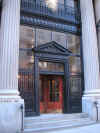 |
New York
Architecture Images-Greenwich Village Forbes Magazine Building |
||
|
architect |
Carrere & Hastings, Shreve & Lamb | ||
|
location |
60-62 Fifth Ave at West 12th St. | ||
|
date |
1925 | ||
|
style |
Art Deco, Neoclassical | ||
|
construction |
limestone | ||
|
type |
Office Building | ||
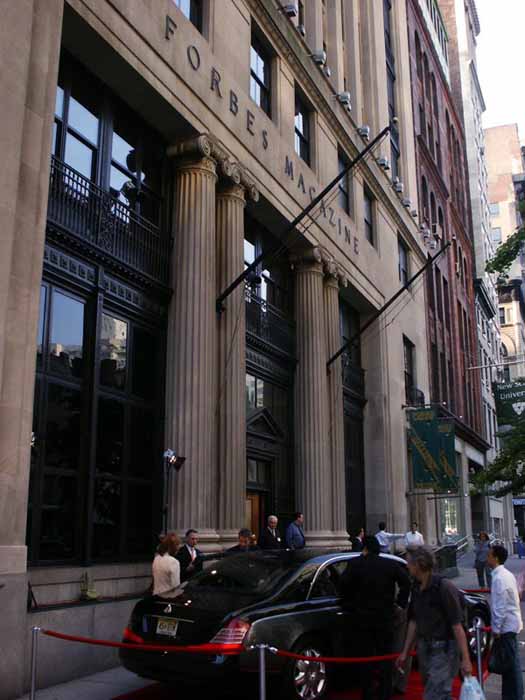 |
|||
| Image- with special thanks to Rick Stasel | |||
|
|
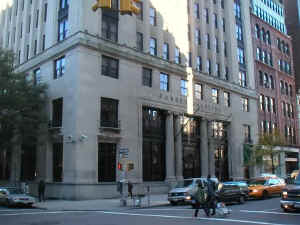 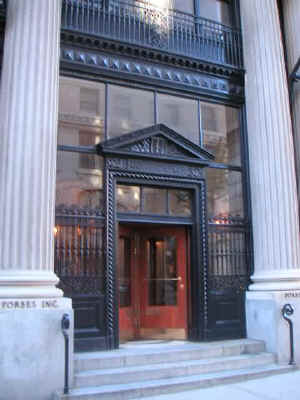 |
||
|
|
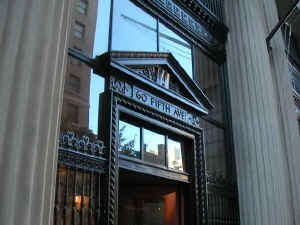 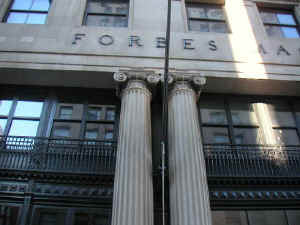 |
||
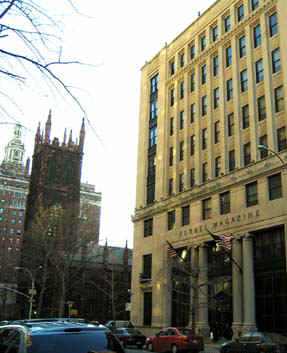
|
|||
The Forbes Magazine GalleriesLocated in the Forbes Magazine building at 60 Fifth Avenue, this free museum displays an intriguing assortment of goodies that the late Malcolm S. Forbes, Sr. began collecting back in the 1930's. The impressive collection features over 12,000 toy soldiers, 500 toy boats, 12 Fabergé Imperial Easter Eggs (only Queen Elizabeth has more) and objets d'art, Presidential papers and historical documents. The gallery also displays other memorabilia including as antique trophies and several original versions of the game Monopoly.
|
|||
|
Money Can’t Buy You Love
Forbes admits that he hasn’t taken a day off since sometime in August (he can’t seem to remember exactly when) and doesn’t plan to again until Thanksgiving, but claims he isn’t exhausted or even particularly tired. Bill DalCol, who oversees his schedule, doesn’t seem to care if he is. “He understands the mission at hand,” DalCol says with no hint of a smile. “He only has to keep it up through April or May.” The question is, Why would he want to? Despite his best efforts, his campaign seems to be going nowhere at great expense. Why not hang it up now and with dignity, take early retirement to a private island and spend the next 30 years sipping fruity cocktails and making targeted campaign donations? Or, better yet, why not use what has become a formidable campaign organization to run for and win the open Senate seat in New Jersey? Forbes won’t even dignify the question with an answer. “The Bush people have been fanning that for weeks,” he says. “My feeling is that if Hillary can run in New York, I’d be very supportive if Governor Bush was to run in New Jersey.” Forbes has delivered the line countless times, but he still snorts with what sounds like genuine laughter as he says it. His staff, however, doesn’t see the humor. Ask why Forbes is still in the race and you’ll get blank stares followed by a patient lecture explaining that everything is going precisely according to plan, down to the 4 percent USA Today poll. “We’re right where we need to be,” says DalCol. “I don’t know that we’d want to be in any stronger position right now.” That’s right, says Greg Mueller. “The campaign, we feel, is in a very good position.” How can smart people say things like this? For starters, the Forbes people dismiss national polls as meaningless in a Republican primary. “Who’s actually pulling the levers?” asks Mueller. “It’s not the people reflected in Newsweek polls.” Rather, they claim (with some justification), that the only people who matter in a primary are the Republican faithful, the fabled Base, who for the most part are conservatives. And conservatives prefer Forbes—who, since the implosion of the Quayle, Buchanan, and Bob Smith campaigns, is the only true conservative left in the race. That’s the idea. Never mind that it ignores the existence of Gary Bauer, another true conservative whose presence poses a real threat to Forbes’s performance in the Iowa caucus. (In public, Forbes staffers pretend to be not quite sure who Bauer is. John McCain, meanwhile, is written off as moderate and therefore irrelevant to the strategy.) The real problem with the Forbes scenario is that it ends there. Forbes strategists can go on for hours about the weaknesses of the Bush campaign—too liberal, wildly bloated, insufferably arrogant, etc., etc.—but ask them how, exactly, their candidate is going to win the nomination and they become notably inarticulate. They are particularly vague when it comes to individual primaries. All point out that in past elections underdogs have frequently done better than expected, while a long lists of front-runners have crashed and burned. Pollster John McLaughlin likes to remind reporters that in the fall of 1979, Sen. Ted Kennedy was far and away the favorite in the 1980 election, beating Ronald Reagan in surveys by two to one. Others resurrect the memory of Pat Buchanan, who months before the 1996 New Hampshire primary was trailing Bob Dole by 40 points. Buchanan, of course, wound up winning. You might assume that the moral of the story is that Steve Forbes has a real chance to take New Hampshire. But no. Forbes staffers don’t seem to expect a victory there. Or, for that matter, in Iowa, the state where Forbes has spent the most time and money. In fact, it’s not clear what state the Forbes campaign expects to win. At first, Bill DalCol seems to suggest a Bush rout will come early. “We’ve got to take Bush out within the first eight,” he says. Asked how and where this will take place, DalCol hedges. “It would be helpful if we won one,” he explains. Forbes himself indicates that losing the first eight primaries would not necessarily be enough to force him from the race. “It depends on the circumstances at the time,” he says. After a while it becomes clear that Forbes plans to stay in the race for a long, long time, regardless of how he fares in the early primaries. And, in fact, staying in for a long time is at the heart of what passes for his strategy. Even if Forbes were to lose eight primaries in a row, even if John McCain were to win New Hampshire, thereby becoming the undisputed alternative to Bush, the Forbes people argue that their candidate would still be the only credible challenger, simply because he has the most money. And once everyone but Bush drops out for lack of cash, Forbes will still have the reserves to hammer the front-runner with negative ads (or “engage him with our message,” as Greg Mueller puts it) and ultimately topple him. Just about every political professional outside the Forbes campaign regards this scenario as borderline crackpot. In fact, early victories are crucial. In 1996, Forbes’s surprisingly poor showing in Iowa (he was expected to place second; he came in fourth) cost him 10 points in New Hampshire overnight. He never recovered. Forbes strategists don’t seem to understand that if McCain (or, for that matter, Bauer) actually won an upset victory in an early primary state, his fund-raising would jump accordingly. More important even, an upset winner gets so much free media attention, it can catapult him ahead in other states. Winning primaries, in other words, is the only way to win primaries. Which one do the Forbes people think he can win? If they have one in mind, it’s a closely held secret. Instead of victories, they would rather talk about money, a subject on which Forbes and his staff appear to have bought their own spin. “He’s Lamar with money,” says Steve Schmidt, who, as the former communications director of Alexander 2000, ought to know. “Steve Forbes is not going to be president of the United States, declares James Carville, a connoisseur (despite his partisan hackery on television) of strategy and technical skill in politics. “I think you or I would have a better chance of winning. I know of no other political person—Republican or Democrat—who doesn’t agree with me.” The Forbes campaign, of course, doesn’t agree. Bill DalCol dismisses doubts about Forbes as a symptom of insular, inside-the-Beltway thinking. Or of something more sinister. The national media, DalCol says, are members of the same “club”—a club from which Steve Forbes, as an outsider, is excluded. “A lot of these [reporters] socialize with the establishment players,” DalCol explains. “The establishment players are all with Bush.” Moreover, he says, Forbes is a magazine publisher. If you’re a journalist, “who is the enemy? The publisher, the company. He happens to come out of the publishing industry. That’s something we have to overcome.” It’s easy to mock conspiracy theories like this. But they have been of great use to the Forbes campaign. For one thing, they allow Forbes’s staff to ignore the biting coverage their boss often receives. And they allow Forbes himself to continue his bid for the presidency unhampered by doubts that perhaps the critics are right. All of which may explain why Forbes, at 4 percent in national polls, sometimes behaves like the front-runner. For instance, when he issues slightly pompous statements on matters of concern to the International Community (the earthquake in Turkey, the civil rights of Catholics in Northern Ireland). Or when he faxes out press releases about subjects so trivial that it’s hard to believe a human being actually sat down and typed them out (“FBI Veteran Named Forbes Security Director”). Or when, as he does every day, he acts as if at some point soon he will be president of the United Tucker Carlson is a staff writer at the Weekly Standard |
|||